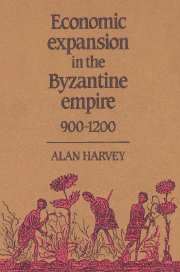Book contents
Summary
The pattern of economic development which has been presented here differs from the standard orthodoxy of Byzantine agrarian history and corresponds in general terms to that of the medieval west much more closely than has usually been allowed. Although the limitations of the surviving source material do not permit the more detailed analysis of economic trends which is possible elsewhere, the upsurge in economic activity in the eleventh and twelfth centuries is unmistakable. The major factor which has encouraged historians to differentiate Byzantine economic history from that of western medieval Europe is the emphasis on the role of the state. To some extent this is understandable because many of the documents surviving in the monastic archives were issued by the state and Byzantine writers viewed events with a Constantinopolitan perspective. Indeed, the important functions of the state in putting coinage into circulation and in stimulating economic demand through its expenditure should not be minimised. Nevertheless, a tendency to work out the chronology of Byzantine economic history within a framework determined by the political fortunes of the state has led to a much greater emphasis on the eleventh century as a turningpoint in Byzantine economic fortunes than the evidence warrants. This interpretation originated in attempts to explain the political reverses of the 1070s and 1080s by a corresponding economic decline.
- Type
- Chapter
- Information
- Economic Expansion in the Byzantine Empire, 900–1200 , pp. 244 - 268Publisher: Cambridge University PressPrint publication year: 1990



